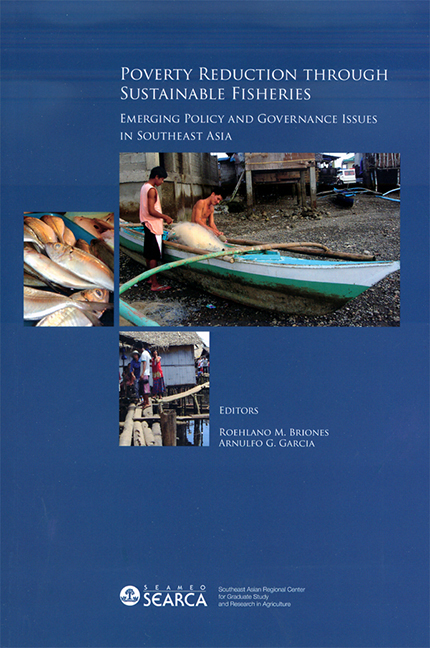 Poverty Reduction through Sustainable Fisheries
Poverty Reduction through Sustainable Fisheries Book contents
- Frontmatter
- Contents
- Figures
- Tables
- Foreword
- Acknowledgments
- 1 Introduction and Synthesis
- 2 Fish and the Poor
- 3 Fish and the Poor: The Case of Cambodia
- 4 Changing Demand and Supply Structure of Fish in Asia: Past Trends and Future Projections
- 5 Regional Economic Integration of the Fisheries Sector in ASEAN Countries
- 6 Technology Policies for Capture Fisheries and Aquaculture in Southeast Asia
- 7 The Status, Current Trends and Future Directions for Production and Technology of Fisheries in Southeast Asia
- 8 The Seafood Supply Chain and Poverty Reduction
- 9 Strategy for the Empowerment of Aquaculture Fish Farmers in Indonesia
- 10 Status of Coastal and Marine Resources: Implications for Fisheries Management and Poverty in Southeast Asia
- 11 Property Rights and Institutional Arrangements in Southeast Asian Fisheries
- 12 Regional Cooperation in Aquatic Resource Management for Southeast Asia
Foreword
Published online by Cambridge University Press: 21 October 2015
- Frontmatter
- Contents
- Figures
- Tables
- Foreword
- Acknowledgments
- 1 Introduction and Synthesis
- 2 Fish and the Poor
- 3 Fish and the Poor: The Case of Cambodia
- 4 Changing Demand and Supply Structure of Fish in Asia: Past Trends and Future Projections
- 5 Regional Economic Integration of the Fisheries Sector in ASEAN Countries
- 6 Technology Policies for Capture Fisheries and Aquaculture in Southeast Asia
- 7 The Status, Current Trends and Future Directions for Production and Technology of Fisheries in Southeast Asia
- 8 The Seafood Supply Chain and Poverty Reduction
- 9 Strategy for the Empowerment of Aquaculture Fish Farmers in Indonesia
- 10 Status of Coastal and Marine Resources: Implications for Fisheries Management and Poverty in Southeast Asia
- 11 Property Rights and Institutional Arrangements in Southeast Asian Fisheries
- 12 Regional Cooperation in Aquatic Resource Management for Southeast Asia
Summary
Agriculture has traditionally been associated with the utilisation of land-based resources. However, large segments of the rural poor in Southeast Asia are dependent on living aquatic resources, whether as consumers, fishers in coastal and inland waters, or fish farmers. Policy research has only recently begun to renew its focus on fisheries, leaving a host of policy issues related to poverty reduction and sustainability relatively unexplored.
As a regional leader for agriculture and rural development, SEARCA has embarked on a collaborative research agenda for the fisheries sector, where many of the rural poor are dependent for their livelihood and food. To frame that agenda, the initial step was to conduct a set of expert reviews to synthesise what is known and not known, thereby highlighting important gaps in policy research. To this end, a conference participated in by top practitioners and researchers in the field of Southeast Asian fisheries was co-organised by SEARCA, WorldFish Center, and PCAMRD. Papers were presented and critiqued in discussions. Following the conference, the papers underwent further peer-review and technical editing.
This book contains the papers, including a synthesis of agenda for future research, presented during the conference. SEARCA offers this work as a handy reference material, providing insights to policy makers, researchers, and agricultural and rural development administrators to aid them in their decisionmaking processes.
- Type
- Chapter
- Information
- Poverty Reduction through Sustainable FisheriesEmerging Policy and Governance Issues in Southeast Asia, pp. xiiPublisher: ISEAS–Yusof Ishak InstitutePrint publication year: 2008


